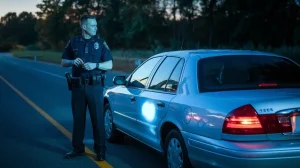DUI checkpoints ordinarily involve standardized patterns for stopping vehicles, as well as the use of portable breath tests (PBTs) and SFSTs – Standardized Field Sobriety Tests to assess possible alcohol consumption and appreciable impairment. North Carolina law allows law enforcement agencies to set up checking stations and roadblocks pursuant to N.C.G.S. 20-16.3A to check for things like license violations and to enforce the “drunk driving” (impaired driving) laws. The process must follow certain constitutional and statutory guidelines to avoid arbitrary or discriminatory stops.
license violations and to enforce the “drunk driving” (impaired driving) laws. The process must follow certain constitutional and statutory guidelines to avoid arbitrary or discriminatory stops.
The following content is a general overview of how roadblocks and checking stations work, including the difference between a brief roadside stop and a more formal implied-consent procedure. If you have questions about a checkpoint stop in North Carolina—or wish to talk about a specific legal concern related to N.CG.S. 20-16.3A—call or text the Powers Law Firm at 704-342-4357, or email Bill Powers at Bill@CarolinaAttorneys.com.
 Carolina Criminal Defense & DUI Lawyer Updates
Carolina Criminal Defense & DUI Lawyer Updates